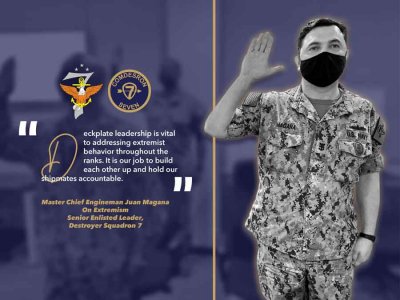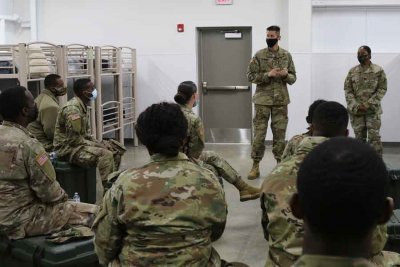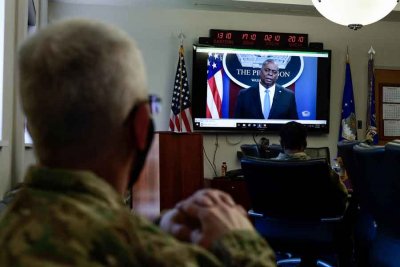Congress Urges DoD, VA to Defend Troops and Veterans Against Extremists Who Want to Recruit Them
The House Committee on Veterans’ Affairs recommends the Defense Department and Veterans Affairs work more actively to identify, prevent, and combat the problem of violent extremism among veterans and military members as they approach the end of their service, a report released to The War Horse states.
The report, which summarizes testimony from two committee hearings in the past year, finds that, while no single pathway leads to or predicts radicalization, military service and the transition to civilian life include stressors that can make some veterans vulnerable to recruitment tactics used by extremist groups.

A graphic quoting Master Chief Engineman Juan Magana, senior enlisted leader, Destroyer Squadron Seven, on extremism in the ranks from a Department of Defense-wide stand down. Graphic by Mass Communication Specialist 2nd Class Remundo A. Villegas, courtesy of the U.S. Navy.
The committee recommends prevention and intervention programs for both service members and veterans. The committee also called for the government to collaborate with veterans organizations to better understand the threat and to provide peer support to service members as they leave the military.
“Ideologically motivated violence must be rejected by everyone in public office—and it must be a bipartisan concern,” Rep. Mark Takano, the committee chairman, says. “Acknowledging the small but growing threat of violent extremism among the veteran population does not impugn all veterans. But ignoring this phenomenon is a disservice to those who continue to support and defend the Constitution, and forsakes our ability to formulate effective solutions for countering it.”
In testimony last October, congressional witnesses laid out the degree to which extremist groups target veterans, as well as the consequences of radicalization. The vast majority of veterans do not hold extremist world views, but ideologically motivated crimes by veterans have increased. The annual number of violent extremist crimes committed by military veterans over the last 12 years is two-and-a-half times higher, on average, than the number committed in the two decades before that—a figure that does not include the Jan. 6 riot at the Capitol, where almost 20% of the rioters charged had military backgrounds, according to an NPR analysis.
Far-right, racist ideologies have motivated the majority of these crimes. A military veteran who planted a pipe bomb filled with nails and screws at the 1996 bombing at the Atlanta Olympics, where two people died and more than 100 were injured, later said he hoped to “embarrass” the U.S. government over its stance on legal abortion. Veterans also carried out mass shootings at a Sikh temple in Wisconsin in 2012 and a Jewish center and retirement community in Kansas in 2014. Several of the men accused of planning to kidnap Michigan Gov. Gretchen Wilson in 2020 served in the military.
Extremist groups actively target veterans for recruitment, seeking to capitalize on the leadership, weapons skills, and tactical training veterans often have. At the same time, many of these groups believe the respect and trust veterans command will help their organizations appear legitimate.
Award-Winning Journalism in Your Inbox
“Within the far-right extremist culture, the idea of having military folks or people with military experience in your ranks is a way to boost the status of your organization,” says Peter Simi, an associate professor of sociology at Chapman University who testified at one of the hearings.

U.S. Army Col. Robert J. Coker, commander of the 642nd Regional Support Group, and brigade Command Sgt. Major Denise Demps discuss the dangers of extremist groups with troops during a Combined Training Readiness Exercise April 24, 2021, at Fort McClellan, Ala. Photo by Sgt. 1st Class Gary A. Witte, courtesy of the U.S. Army.
Ignoring the factors that make some veterans vulnerable to this type of recruiting risks exacerbating the problem and undermines the service of current and former military members, the committee reported. The transition from military to civilian life can isolate people, and veterans sometimes find the skills they cultivated in their military careers don’t easily translate into the civilian workforce. Accessing veteran health care, housing, or education benefits can be a confusing process. The shift in identity upon leaving the military can be disorienting, as can the loss of a clear sense of mission or purpose. And experiencing trauma, especially without care or assistance, can make some people more vulnerable to extremist recruiters: The percentage of service members who experience at least one traumatic event is higher than it is for the general population.

Master Sgt. Michael Riggenbach, the noncommissioned officer-in-charge of the 910th Airlift Wing safety office, watches a recorded video of Defense Secretary Lloyd J. Austin III addressing the issue of extremist ideology within the military during a base-wide pause in training on May 1, 2021, in the 910th Airlift Wing headquarters building, Youngstown Air Reserve Station, Ohio. Department of Defense policy expressly prohibits military personnel from actively advocating for or participating in supremacist, extremist, or criminal gang doctrine, ideology or causes. Photo by Tech. Sgt. Jeffrey Gross, courtesy of the U.S. Air Force.
In its report, the committee highlighted the importance of peer support for veterans who are at risk of radicalization. While radicalization often occurs at a peer level, John Horgan, the director of Georgia State University’s Violent Extremism Research Group, wrote in his testimony, peer support can also be particularly effective in helping people avoid or leave extremism.
Those closest to vulnerable veterans—family, friends, or fellow veterans—have a front-row seat to witnessing the challenges of transitioning to civilian life. Military family groups and veterans service organizations can help connect service members and veterans with each other and with resources, helping to provide community and support during a transition, and afterward.
Many of these organizations are already actively working to engage veterans and fight against violent extremism. Groups like We the Veterans have initiatives to increase veteran civic engagement. Parents For Peace supports family members of veterans and others at risk of radicalization. In its recommendations, the House committee called for the Department of Defense and VA to collaborate with groups like these to better understand extremist recruitment and develop programs to teach prevention and intervention strategies to active duty members and veterans.
Our Journalism Depends on Your Support
The committee also recommended more sustained research on the recruitment and radicalization of military veterans, pointing to legislation Rep. Takano, a Democrat from California, introduced last year to improve VA-funded research broadly. It also said VA providers should be trained to identify and help veterans at risk of radicalization, just as they do for veterans at risk of suicide or homelessness.
This War Horse feature was reported by Sonner Kehrt, edited by Kelly Kennedy, fact-checked by Ben Kalin, and copy-edited by Mitchell Hansen-Dewar. Headlines are by Abbie Bennett.





Comments are closed.